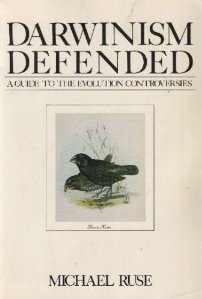
Was
Darwin
Wrong?
 Was Darwin Wrong? |
Home | Intro | About | Feedback | Prev | Next |
|
a review by Gert Korthof
25 Aug 1998

|
"To a convinced Darwinian like myself it may seem puzzling that in this day
and age Darwinism should still be in need of defense. [...] The attacks come not
only from fundamentalists, but surprisingly also from humanists, philosophers and
even from certain biologists who accept evolution but reject the Darwinian explanation.
We must be grateful to Michael Ruse for having undertaken to scrutinise the validity
of the anti-Darwinian arguments." ( from the Foreword by Ernst Mayr ) This book addresses the central questions of my site: Was Darwin Wrong? and Are there legitimate doubts about the theory of evolution?. Where did the doubts about Darwin's theory start ? Did creationists start doubting ? And which doubts ? For some it may be a surprise to learn that not even the scientific critics in Darwin's time where the first to note problems in Darwin's theory. It was Darwin himself who devoted a Chapter to "Difficulties on Theory", the gaps in the fossil record (the lack of intermediates). Today's creationists repeat, focus and build on the problems Darwin himself discussed in The Origin of species. Indeed, in that sense creationists are followers of Darwin! Neo-Darwinists however focus on elaborating Darwin's theory and doing experiments. That's why in textbooks on evolution the results of research are presented, not doubts. But there were books published by a scientific minority about problems in Darwinism. "Darwinism Defended" is the book to find out where today's creationists get their information from. Here is a book about controversies in evolution biology. The last two chapters (13 and 14) are about creationism itself. | ||
Natural and artificial selection |
Are mutation and natural selection adequate to explain micro- as well as macro-evolution? This is an important argument of creationist writers such as Phillip Johnson and Michael Denton. Ruse studied Darwin's contemporaries and concluded: "It is one thing to accept selection per se and is quite another to agree that selection can do everything that Darwin claimed for it." (page 51); "Whether natural selection could indeed do all that Darwin hoped was certainly not known in Darwin's lifetime" (p52) and: "People were simply not convinced that natural selection could cause design features" (p54). For example the famous biologist and evolutionist Thomas Huxley disbelieved the effectiveness of natural selection, simply because he saw artificial selection as being of but limited effectiveness. This point of view is repeated by Phillip Johnson(1993). Anti-Creationists claiming that this criticism is pseudo-scientific, are historically wrong. Science textbooks are generally ahistorical: they do not report on doubts, rejected hypotheses, and false results, but pick out success stories to teach students. | ||
Ruse's criticism of Scientific Creationism. |
At the time of publication of Darwinism defended (1982/1983), Denton's Evolution: A theory in crisis was not yet published. So he could not analyse or refute Denton's arguments. To describe the claims of creationism, Ruse uses the Public School Edition of "Scientific Creationism" (1974) by H. Morris of the Institute for Creation Research, ICR. The public school edition does not contain Biblical references, but tries to justify its claims solely on a scientific basis. In Chapter 13 (Creationism expounded) Ruse first summarises the book chapter by chapter and finally in Chapter 14 (Creationism Considered) comes to his conclusion:"You know where I stand, of course. But let me be quite categorial. I believe Creationism is wrong: totally, utterly and absolutely wrong. I would go further. There are degrees of being wrong. The Creationists are at the bottom of the scale." (page 303).This is understandable, because Morris' book contained all kind of stupidities (stupidities, which creationists like Denton, Johnson and Behe take care to avoid). Subjects discussed are: claimed commitment to 'evolving laws', purpose and design in nature, second law of thermodynamics, origin of life (Miller's experiment, improbability of the origin of life by natural causes), natural selection is conservative, mutation is harmful, embryology, homology, paleontology, gaps in the fossil record, living fossils, human footprints in the Cretaceous, the flood, the age of the earth, dating techniques, growth of the human population, human fossils. Notes
Further Reading
|
| korthof.blogspot | home: wasdarwinwrong.com | wasdarwinwrong.com/kortho11.htm |
| Copyright © 1998 G.Korthof | First published: 19 Jan 1998 | Last update: 25 Aug 1998 |